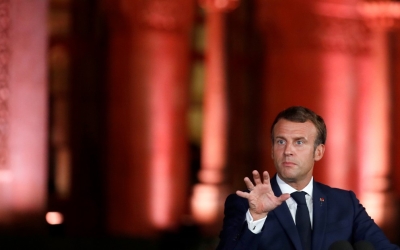Lebanon's president demands US evidence to justify Bassil sanctions

Lebanon's President Michel Aoun said on Saturday that his country would seek evidence and documents from the United States that had led Washington to impose sanctions on his son-in-law, Gebran Bassil, a former foreign minister.
The US on Friday blacklisted Bassil, leader of the Free Patriotic Movement (FPM) party, Lebanon's biggest Christian political bloc and founded by Aoun.
Stay informed with MEE's newsletters
Sign up to get the latest alerts, insights and analysis, starting with Turkey Unpacked
The US has accused Bassil of corruption and ties to the Iranian-backed Hezbollah movement, which Washington classifies as a terrorist group.
Aoun asked Lebanon's caretaker foreign minister, Charbel Wehbe, to obtain evidence and documents that should be submitted to Lebanon's judiciary "to take the necessary legal measures," the presidency tweeted.
In September, Aoun had issued similar directives after Washington had blacklisted two former government ministers over accusations of aiding Hezbollah.
On Friday, US Treasury Secretary Steven Mnuchin had announced the blacklisting in a statement issued on his department's website.
"The systemic corruption in Lebanon's political system exemplified by Bassil has helped to erode the foundation of an effective government that serves the Lebanese people," said Mnuchin.
"This designation further demonstrates that the United States supports the Lebanese people in their continued calls for reform and accountability."
Presidential ambitions
Bassil, who has presidential ambitions, has also previously served as minister of telecoms and of energy and water.
"Sanctions have not scared me nor promises tempted me," Bassil said in a Twitter post following the US announcement.
"I will not turn against any Lebanese, and I will not save myself for Lebanon to perish. I became accustomed to injustice and learned from our history: we are destined in this Orient to carry our cross every day... to survive."
The FPM has a political alliance with Hezbollah, which has become Lebanon's most powerful political force. Bassil has defended the group as vital to the defence of Lebanon.
Hezbollah condemned the sanctions as blatant interference aimed at forcing US "dictates" on Lebanon.
The sanctions could complicate efforts by Prime Minister-designate Saad al-Hariri to navigate Lebanon's sectarian politics and assemble a cabinet to tackle the country's spiralling financial problems.
Lebanon is facing its worst crisis since its 1975-1990 civil war, a situation rooted in endemic corruption and mismanagement.
The US Treasury Department accused Bassil of being at the "forefront of corruption in Lebanon".
A senior Washington official said that Bassil's support for Hezbollah was "every bit of the motivation" for targeting him for sanctions.
Bassil has been designated according to the Magnitsky Act, which authorises the US government to sanction individuals perceived as human rights offenders, freeze their assets and ban them from entering the US.
Middle East Eye delivers independent and unrivalled coverage and analysis of the Middle East, North Africa and beyond. To learn more about republishing this content and the associated fees, please fill out this form. More about MEE can be found here.






